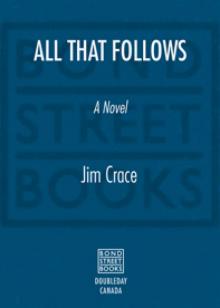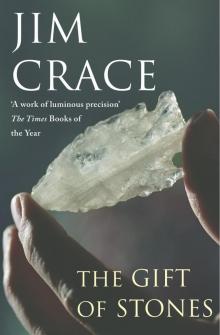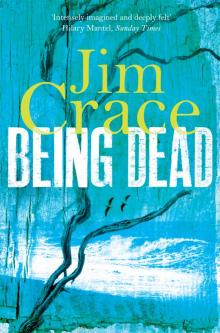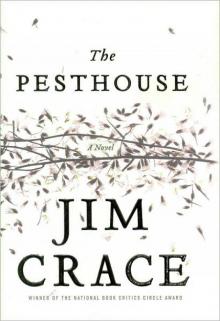(2007) The Pesthouse Read online
Page 7
They fell quiet again, both exhausted, as they reached the last few houses in the town and started on the flood-smoothed slopes above the river. Here, eighty paces away, there was finally some welcome evidence of life: people, horses, mules, livestock tied to the backs of carts, some ducks and chickens in baskets, even one or two dogs, on leashes to stop them running off to tuck into the corpses.
A group of lucky latecomers to Ferrytown — fewer than forty adults — had gathered at the river's edge, uncertain what to do. They knew exactly what they wanted. They wanted some kind of godly hand to bring the raft ashore from the midstream shingle where it had irretrievably grounded itself and ferry them to safety. The adults had gathered around to exchange ideas on how they could rescue the lost raft, how they could manage it if they succeeded. Was it possible to cross with carts or were the rapids too strong and the channel too deep for wheels and horses? There was a smaller barge, strong enough only for human passengers, in one of the lofthouses just fifty paces away, as Margaret well knew. She would have told them, certainly. She would have told them, too, about another route, a dry one, that would allow them all, though not their carts, to reach the eastern side safely and quickly. But she was not allowed to help. Once her shaven head had been remarked, and — further evidence of her sickness — it was seen that she was being carried, the travelers shouted out at her to keep her distance; and then, when she and Franklin continued to approach, hoping to explain themselves and join the group, the men began to pelt the pair with stones and even draw their bows and exercise their staves. A man ran forward and a sling shot of shingle struck Margaret's back and the side of Franklin's head as they turned to make their escape. His ear was cut.
Margaret jockeyed Franklin to a path that headed upstream on the river's bank, until, at the back of a group of boathouses, they reached a dry rocky ledge surrounded by planted fruit trees where someone had built a wooden bench and a fishing platform. Beyond the ledge the river narrowed into cascades and was no longer navigable, except to trout. Franklin could carry her no farther, and she could ride no more. It had been a heavy day. Margaret could rest. But he had duties to perform. He would have to leave her there alone for the afternoon. She took the knife he offered, though she was in no state to protect herself if she were discovered by any of the living emigrants, or any ghosts.
Franklin, wrapped up in his brother's coat, his mouth and nostrils stuffed with wads of cloth, had agreed to Margaret's shame-faced proposition (why hadn't she thought of it while they were there?) that he should take the risk of going back into the village and to her home to make the best of their chances in the voyages ahead. As soon as he arrived in the compound, he should wash his hands and face — and the cut on his ear — in fresh vinegar, she warned him. There was a pot of it outside her family house. Then he should begin the job of salvaging. Should he salvage other people's property, he asked. 'It can't be theft, to take things from the dead.' No, it wasn't theft, perhaps, she agreed, but it wasn't seemly either.
Franklin went first to the second-largest boathouse, as she'd suggested, and found the open-keeled barrow that was used to wheel the one-man skiffs down to the fishing pools. He spread one of his tarps across the baseboards and tied the corners to the uprights of the frame with creel ropes, so that his barrow had a strong, sagging basket for carrying their spoils. The vehicle was long and clumsy in his hands at first, but Franklin was strong enough, despite his nagging back and still troublesome knee, to push it on his own. He soon got used to it, the trick of trading weight with balance, allowing the one to take care of the other. He was glad of having something useful to do, as, otherwise, his head would have been overcome with fear, doubt, grief, dismay... too much gloom to quantify. At least he had a purpose now and, he anticipated, a companion for the future who might be as dependent on him as he had been on Jackson. A new experience. His world had never been shaped that way before.
He and Margaret hadn't settled on a plan exactly, but no matter. A plan might not be of any value in a world where everything had already been bludgeoned out of shape. They'd simply have to proceed instinctively, like children trying to walk a tightrope. There were no choices to be made on a tightrope: just the one and only step ahead, and then the next.
His first step was to load the barrow with provisions. Taking fresh food would not be sensible, she'd said. An illness always settles on the food. But it might be sensible, if not entirely safe, to bring as much sealed food as he could find. She told him where the family larders were, where Ma had stored her honey and flagons of juice, where he might secure a good supply of salted meat and taffies as bright and hard as flint, which Margaret had made herself. She told him what clothes she wanted from her box, where blankets were that had not been tainted yet by the occupancy of death.
It was an odd experience, opening her box of clothes and other possessions. The smell was intimate for the few moments that it resisted the stronger odor of the dead from rooms that, thankfully, Franklin did not have to visit again. He could see how careful she had been with her possessions, packing everything tenderly in matching folds. He found the woolen pants that she'd described, the cloak, the green and orange woven top, the hat and scarves, the undershirts. He added the cleanest of her combs and a stiff hairbrush, with tangled copper evidence of her ownership. Her hair would grow again, to be as long as the strands caught between the brush's teeth — and he would see it growing. How many years would that take?
What would his mother say if she could have witnessed what he did next? He opened chests and cupboards, uninvited, the looter, looking for valuables, some jewels or decorations they might trade, or anything to benefit their journey. But finally the stench of death and his fear of it was too much for him, and he fled the compound with nothing more except for some nicely carved ceremonial platters, a heavy silver cup that surely must be valuable, a hunting bow and a wrap of as yet unbloodied arrows. Already men had drawn their bows at him that day and loosed their slings, so he would be prepared next time. Jackson would be proud of him.
The family yard provided more: two extra water bags; some cattle skins, scraped but not yet completely cured; a coil of decent rope; a pair of wading boots; and a weighted fishing net. Finally, he damped his face and neck with vinegar and poured what remained over his hands.
The boat barrow was not overloaded, but it was heavy, though slightly easier to maneuver now that it was weighted down with spoils. He added one more thing, a lover's touch. He lifted the clay pot of kitchen mint, which was growing on the porch beside the cat and chair, and wedged it safely at the center of the barrow load, so that the leaves would not be damaged. He hoped that this one living thing from Ferrytown might bring Margaret some comfort, though the plant itself was gasping for water after its almost three dry days of neglect and no rain. Surely she'd be grateful for his gifts, though gifts was not perhaps the right word for property that was either already hers — the comb and brush — or her unexpected inheritance — the family platters that she would have eaten off on feast days and at funerals, the mint that would have flavored so much of her summer food, the silver cup whose purpose, probably, was just to be valuable.
Franklin could have — should have, almost certainly — abandoned Margaret at this point, now that he was so well equipped and so enriched. Any sensible man would have. Any person truly set on getting to the coast would not have stripped his chances to a sliver by traveling with a plague-ridden stranger who had to be carried. There were companions at the ferry point whom he might join, if he disguised himself by taking off his coat. He could trade his strength for their camaraderie and for their meals. He could save himself from many of the troubles ahead by being level-headed now. But then — what had his brother said? — 'only the crazy make it to the coast.'
It had taken Franklin Lopez half the afternoon to equip himself from the pickings of Margaret's compound for their journey, and only half a moment — once he was certain that there was nothing else of irresistible benefit — to
set a flame to Margaret's family home, as she had requested, and do her folks the honor of cremation. He was more than fifty paces away, still negotiating the rutted lane with his long barrow, before he heard the roof straw whoosh and the crack of timbers. And he was a hundred paces away before the smell of fire replaced the stench of bodies, and he began to feel the heat himself. The wind pressed smoke on him, but he was glad of that, glad to have his lungs filled up with something other than the heavy odors of death, glad, too, to have the corpses of those two early risers who had fallen on the steps of their oven house far from their beds hidden from him by the smoke. The wind also helped to spread the fire, carrying the burning chaff from Margaret's roof across the alleyways first to the family outhouses and then into the yards and compounds of other houses, the timbers screeching and the flames leaping from thatch to thatch like nightmare cats.
Franklin hastened forward with his load to reach the outskirts of the village before the fire caught up with him. His size and strength mattered now. He could not afford to rest or be distracted by his problems. Living flesh burns just as well as dead. But when he reached the large guest house, with its adjacent dormitories in a wide lane that he had not walked down before, he knew at once where his brother must have spent his night in Ferrytown. The first dormitory that he entered was where the women migrants slept. It took him only moments to recognize what kind of clothes were hanging over the bed ends — too voluminous and colorful for men — and to retreat outside into the deafening air.
Franklin found the men inside the second rest-house hall. The first room had the boys in it. The larger dormitory was still dark inside. The odor of decay mixed a little with smoke was striking and immediate. But it took a while for Franklins sight to adjust. He moved forward slowly between the three lines of beds, all pushed close together, head to toe, checking on the bodies there through squinting eyes: two dead men in every bed, their clothes and best possessions scattered on the floor. He did not expect to recognize a face. The light was too gloomy. Too many heads were turned and buried in the pillows. Too many men had curled up underneath the bedclothes and were only shapes. No, Franklin was looking for a very bulky corpse, one that would deserve the nickname 'Mighty'. But there wasn't a single body nearly large enough. Nobody's feet protruded from the bed end.
Oddly, at the very tip of the dormitory, one bed, set sideways to the others, was empty, the clothes pushed back tidily. A pair of huge shoes was turned upside down and fitted over the wooden bed knobs. They looked a lot like Jackson's. And certainly that had been Jackson's habit, too, to leave his shoes upturned on his bed head. 'Ready for the fray', he used to say, whenever Ma asked him to remove them and leave them 'where they belonged' under his bed 'like anybody else'.
Franklin moved toward the bed, his heart tight in his chest, his throat suddenly so dry and papery that it felt as if it might tear if he dared to swallow. But he had only a moment to wonder if the shoes he seemed to recognize were really Jackson's. The far end of the dormitory, around the entrance door, ruptured into flames and then began to produce spurts of smoke from both the rafters and the floorboards. The heat was brutal, ruthless and swift. It gobbled up dry wood. Franklin left the shoes to burn. He found the nearest shutter, pulled it open, dropped into the smoky lane and — none the wiser, and even a little less certain than before that Jackson was already dead — ran along the outside of the flame-licked dormitory to save his barrow from the fire.
Most of the little group of emigrants were at the ferry point, still debating what to do about their crossing, when the first smoke reached them, burned wood and roasted meat. The stink put them into a fresh swivet. Now what? What else could go wrong? How on earth would they escape a choking without a ferry and a ferryman? The river was too wide and swollen. What could they do? Wait for the winter to ice the water over? A few families who had circled up their carts on the drier meadows at Ferrytown's eastern edge began to pull their pitches again and move away from the fire. The wind was favorable, but if it came round to the west a little more and they stayed where they were, there was a danger that they might either be driven into the river by smoke or, if the vegetation caught, be burned alive, trapped between the water and the fire. They would have to move out farther with their panicking horses and their vulnerable wooden carts and join their comrades on the fire-proof shingle beach.
But, despite the disturbing stench, none of them truly feared the fire that Franklin had started. It seemed right, in fact — respectful even — that the town should become a crematorium. The fever would be wiped out by the fire. The flames would allow the passage of the dead. Why should that bother them? The past was burning at their backs. The fire was in the west, and not ahead. Hadn't that always been the prophecy, that mother would abandon daughter to the ashes, that father and son would depart from one another in flames, that before the doors of Paradise could open there would have to be a blackened, hot and utter silence in America, which could be quenched only by the sea and would be survived only by the people of the boats?
When Franklin staggered by with his loaded barrow, coughing on the smoke, his shoulders ashy, his ear still bleeding, nobody offered any help. He was the young man in the unforgettable coat, a companion to the fever victim, and should stay away, no matter if that meant remaining on the edges of the town where it was becoming difficult just to breathe, let alone lift and push heavy goods. It didn't matter that the shaven-headed woman was no longer in his company. The migrants kept their distance, waved him on, warned him to keep away, showed their staves and bows, and picked up the stones and shingle that they would use again if he came too close. They did their best to avoid even catching his eye, for that also might be enough to catch the flux.
But, in a sense, they all already had a fever just as murderous and treacherous: emigration fever. It was burning them up and driving them on. This was one of those clarifying points in their migrations (during which 'the Push of Here' and 'the Pull of There' had been equally persuasive), when any remaining instinct to return to their homes went up in smoke. Here was where disease was in command. But there'd be no fever where they were going, would there? They wanted to believe it. There'd be no ague or calenture, no tick disease or cholera, no canker or malaria. Why, they had persuaded themselves, illness would be so rare on that side of the ocean that people would travel for a day just to watch a man sniff.
MARGARET WAS almost insensible when Franklin finally reached her late in the afternoon. Her fever had returned, taking advantage of her tiredness. She'd done too much already that day. She had just about enough energy for growing hair but little else. Franklin simply lifted her — she had no weight — and put her on the boat barrow next to the pot of mint, together with the few possessions they had brought down from the Pesthouse earlier that day.
'We have to get away,' he said; although he suspected she might already be too feverish to hear him. 'It isn't safe. It's...' He raised his hand to signify that there were too many unsafe things to list — the fearful, living emigrants with stones, the fire and smoke that, once they had the height and confidence, would stop only at water, the spores and pollens of disease, the ghosts of all their families that, riding on the stallions of grief, might at any moment come to lasso any stragglers; the fast-approaching dusk; the haunting possibility that Jackson might discover them.
'There is a way,' she managed to murmur. 'A secret way.'
She had a stunning revelation. High on the bluffs, between the cascades and the downfall from the lake where the river was at its narrowest, hidden by the undergrowth, there was a wooden bridge, wide and strong enough to take the weight of a horseman. It would certainly support their laden barrow. 'Just follow this path, up.'
'A bridge?' repeated Franklin, unable to believe her. This was startling if it were true and not some product of her illness. He'd never suspected that there was anything other than a ferry crossing. An expensive ferry crossing! So much per person, so much per animal, so much for each barrow, stage or car
t. A troublesome and unsafe crossing at which there always was a hold-up. A line of people was waiting hopelessly there at this very moment.
'How can there be a bridge?' he asked, almost angrily pushing Margaret's arm to make her wake.
'The bridge is for the townsfolk only. Was,' she explained, struggling with her tenses. 'It's there for us if anybody wants to go across, though no one wants — or wanted to — these days. We keep it, kept it, to ourselves, of course.'
'Of course.' He laughed, not because of Margaret's struggle with words but because one of their immediate problems had suddenly been solved and also because the people of Ferrytown had effected such an audacious deceit. 'I understand! What idiots we are. What clever people you've been. Where is the profit in a bridge? You'd simply pay a modest toll and walk across. But a ferry crossing, now... that's a lot of trouble. A ferry crossing can't be cheap... Pay up, pay up, you have no choice. The river must be crossed. Yes, you were better off as Ferrytown. A place called Bridgetown would never have made you rich!'
Margaret was too tired to smile. She wanted sleep more than anything, because she hoped to escape the wretchedness of leaving home, of consciously inhaling the airborne, burned remains of Ferrytown. But when Franklin began to push the barrow up and along the riverside track toward the secret bridge, toward the hidden, wooden bridge, she managed to add just one encouragement: 'Giddyup.' She understood how little time there was, that if the undergrowth caught fire, as well it might, then the bridge would be destroyed by flames as well. She dared not feel hopeful, she could not be well, she would beat back her grief, until the far bank had been reached and they were out of harm's way.

 All That Follows
All That Follows Quarantine
Quarantine The Gift of Stones
The Gift of Stones The Devil's Larder
The Devil's Larder Genesis
Genesis Continent
Continent Being Dead
Being Dead Harvest
Harvest Signals of Distress
Signals of Distress (2007) The Pesthouse
(2007) The Pesthouse